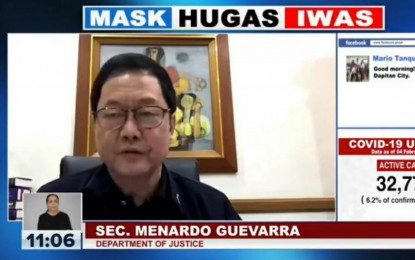
Justice Secretary Menardo Guevarra. (File photo)
MANILA – Justice Secretary Menardo Guevarra on Wednesday said his department will conduct an inventory of cases against rebels who were granted amnesty by President Rodrigo Duterte.
“I will ask the National Prosecution Service (NPS) to do an inventory of cases pending investigation and/or trial involving these classes of people covered by the amnesty proclamations,” Guevarra said in a message to reporters, adding that “dismissals of these cases are not automatic”.
“Persons who may be eligible for amnesty shall be carefully screened and evaluated by the amnesty commission to determine if they actually qualify for amnesty which, incidentally, requires the concurrence of the Congress,” he added.
This came as Duterte earlier signed four proclamations granting amnesty to members of the communist movement, the Moro National Liberation Front (MNLF), the Moro Islamic Liberation Front (MILF), and the Rebolusyonaryong Partido ng Mangagawa ng Pilipinas/Revolutionary Proletarian Army/Alex Boncayao Brigade (RPMP-RPA-ABB).
“The amnesty commission will still determine the rules but the most fundamental criterion is whether or not the offense committed by the subject individual was in pursuit of a political objective,” Guevarra said.
Signed by the President on Feb. 5, Proclamations 1090, 1091, 1092, and 1093 grant amnesty to members of the said groups who have committed crimes in pursuit of their political beliefs.
Duterte said the government’s peace policy is to nurture a climate conducive for peace, as well as to implement programs for reconciliation and reintegration of rebels into mainstream society.
According to the presidential proclamations, the grant of amnesty in favor of the former rebels will “promote an atmosphere conducive to the attainment of a just, comprehensive, and enduring equanimity.”
Granting amnesty is also in line with the government’s call for peace, unity, and reconciliation to bring closure to past enmity, rancor, and bitterness that has stymied lasting amity among Filipinos, the proclamations said.
The amnesty will not be granted to those who have been proscribed or changed under the Human Security Act of 2007 or Republic Act (RA) 9372 or the Anti-Terrorism Act of 2020 or RA 11479.
The proclamations noted that the crimes committed in pursuit of a political belief include “acts and omissions performed or undertaken as part of a plan, program of action or strategy decided by the rebel leadership to overthrow and replace the National Government, any of its political subdivisions, or duly constituted authority, with or without the use of arms.”
The amnesty granted shall not cover kidnap for ransom, massacre, rape, terrorism, and other crimes committed against chastity as defined in the amended Revised Penal Code, crimes committed for personal ends, violation of Comprehensive Dangerous Act of 2002 or RA 9165, and grave violations of the Geneva Convention of 1949.
Other crimes not covered by Duterte’s amnesty are those identified by the United Nations that can never be amnestied such as genocide, crimes against humanity, war crimes, torture, enforced disappearances, and other gross violations of human rights. (PNA)
